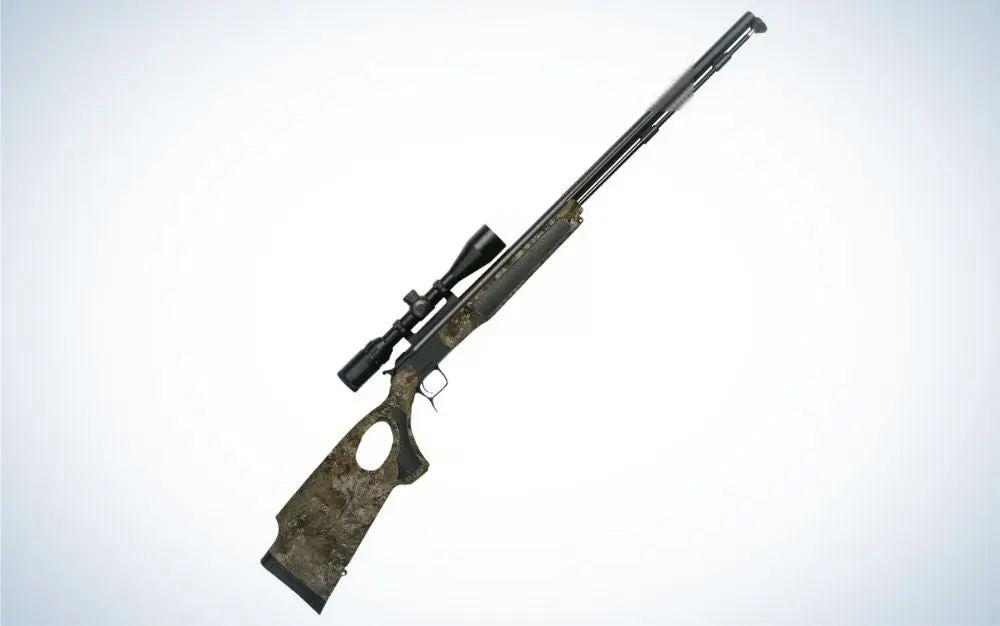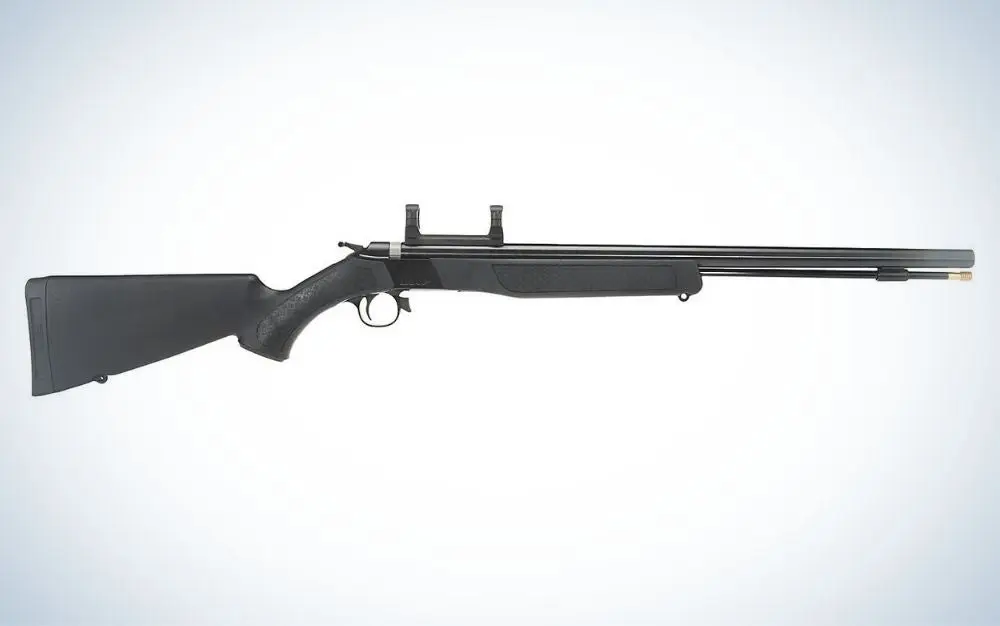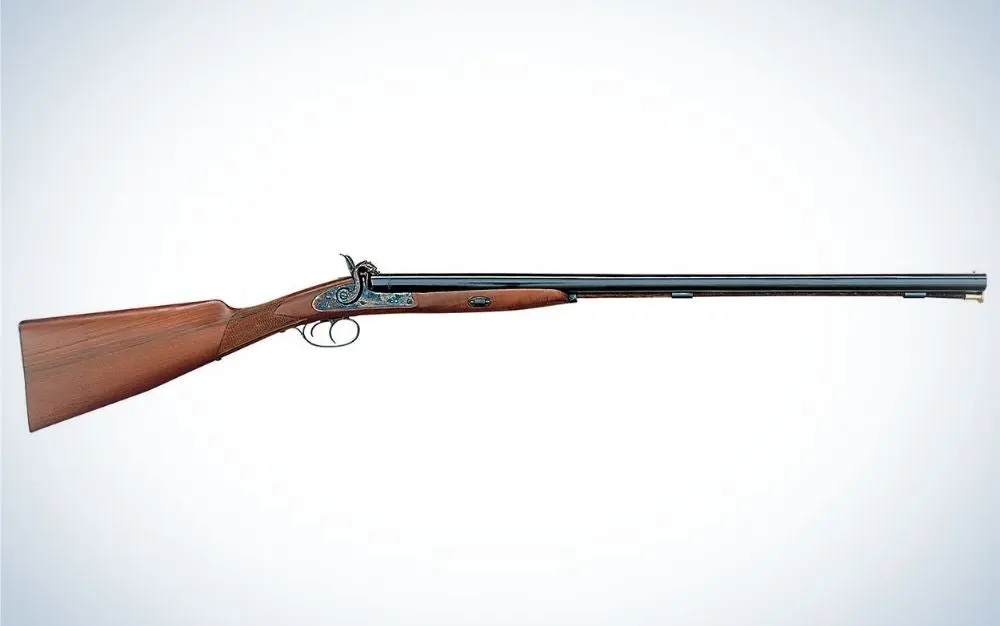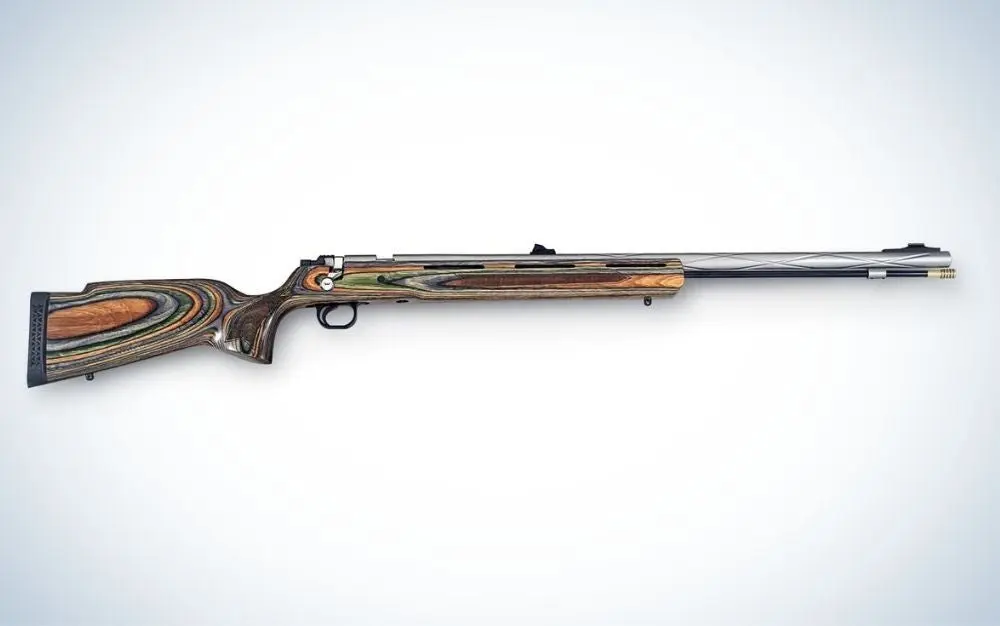_We may earn revenue from the products available on this page and participate in affiliate programs. Learn more ›
_
Best Overall

CVA Accura V2
LEARN MORE
Summary
This versatile .50 caliber can handle big game from coast to coast without a hiccup.
Best Budget

CVA Wolf
LEARN MORE
Summary
The Wolf isn’t just user-friendly, but gets you in the game without breaking the bank.
Most User-Friendly

Traditions Buckstalker XT Redi-Pak
LEARN MORE
Summary
This is as simple a muzzleloader as you’ll find on the market, making it easy to get started.
My introduction to muzzleloaders began back in 1984 when I, tutored by my father, harvested my first black powder whitetail—a fine fat doe—in Ohio’s Harrison County. The rifle? A Thompson/Center Hawken sidelock percussion gun in .54 caliber, a relic by today’s standards. Some 38 years later, I still have the Hawken, and she performs just as well now.
But to say modern muzzleloaders have come a long way is the understatement of the century. Available are high-tech ignition systems, rust-resistant coatings, synthetic … well, synthetic everything. Optics, projectiles, powders; it’s not quite space age, but compared to the Hawken, it just might be. Below are the best muzzleloaders, new, old, and otherwise.
Best Overall: CVA Accura V2
Best Muzzleloading Shotgun: Pedersoli Classic Standard
Best Budget: CVA Wolf
Most User-Friendly: Traditions Buckstalker XT Redi-Pak
Best Long-Range: Knight Long Range Hunter
How We Picked The Best Muzzleloaders
Every piece of equipment we intend to purchase and, theoretically, use, whether it be a lawnmower, power drill, blender, or cell phone must meet certain personal criteria before we buy it. Early on, we hunters often employ a shotgun approach to new gear. That is, we’ll try many, and gradually over time weed out those that, for whatever reason, don’t meet our criteria.
And that’s the bottom line when it comes to the HOW factor here. Do each of these muzzleloaders meet most of our needs, to make us completely comfortable packing them into the timber, the marsh, or the uplands every day of the season? Rather, does each excel in the following:
Price: The “perfect” muzzleloader does you no good if you can’t afford it. I understand affordability runs the gamut from low to high. Knowing this, I created a list that likewise offers this low-to-high range…with an emphasis on the middle.
Handling and Fit: Let’s face it. The “It Just Feels Right” factor does come into play with much of the gear we purchase, black powder arms included. Comfort, handling…they’re important. Aesthetics, too. Though, while pretty doesn’t bag a buck, you want to be proud of your arm every time you take it out of the safe.
Reliability: Cost and appearance be damned. If a muzzleloader doesn’t go BOOM every time I pull the trigger, I’ll have little to no confidence in that rifle or shotgun. Trust and confidence are huge players here. Gear needs to work.
User-Friendliness: Complexity can be—not always but can be—the mother of problems. Rather, the simpler something is, the less likely it is to run afoul of Murphy’s (infamous) Law. Fewer moving parts doesn’t inherently make something better, but it can help.
Accuracy: A muzzleloader doesn’t have to be sub-MOA to be an effective and efficient tool in the field. That said, consistent accuracy is certainly to be considered. Can you hit what you’re aiming at with Muzzleloader X time after time?
Accessory Availability: Plain Jane, like my grandfather’s ’93 Chevy pickup I’ve driven since 2004, works just fine. But sometimes a little bling, necessary or otherwise, is nice. A foundation that allows for accessorizing or easy modifications and customizations can be useful at times.
The Best Muzzleloaders: Reviews & Recommendations
Best Overall: CVA Accura V2
Best Overall

Specs
Caliber: .50
Barrel Length: 30-inch nitride-treated Bergara Barrel
Ignition System: Inline, 209 primer
Weight: 7.6 pounds (rifle only)
Pros
Incredibly user-friendly muzzleloader that is reliable under all weather conditions
Quick Release Breech Plug (QRBP)
Northwest (Open Breech Plug/Nipple) option available
One-piece Dura-Sight DEAD ON scope mount is easy to install and rock solid
Cons
Routine firing pin removal and cleaning necessary
The 30-inch barrel makes it a tad front heavy
I like the Accura V2 so much I own three of them, and I bought one for my stepson a couple years back. At just over seven pounds, the V2 is a joy to carry all day, but not so light that she’s whippy and uncontrollable. At the heart of the V2 is the weather-resistant nitride-treated Bergara barrel, a component obviously key to the rifle’s performance. CVA is so confident in the barrel’s accuracy that they offer a money-back guarantee if the rifle’s not the most accurate muzzleloader the shooter has ever worked with.
The V2’s design is simple and straightforward, the break-action operation familiar to anyone who has ever packed a single-shot shotgun into the squirrel woods. The Quick Release Breech Plug (QRBP) is a godsend, and truly does work as advertised. The thumbhole stock on the V2 scores an A+, genuinely upping my ability to hold the rifle steady in an off-hand position. A word of warning—it is vital the firing pin assembly be broken down, cleaned, and lubricated lightly any time the V2 is fired to prevent pin lag or, worse, a complete lock-up.
Best Muzzleloading Shotgun: Pedersoli Classic Standard
Best Muzzleloading Shotgun

Specs
Caliber: 12 gauge
Barrel Length: Twin 28-inch blued steel barrels
Ignition System: Percussion, #11 caps
Weight: 7.05 pounds
Pros
Well-balanced, weighing in at a smidge over seven pounds
Fixed improved and improved/modified chokes
Reliable percussion ignition system
Satin finish walnut stock and engraved sideplates
Cons
Thinner barrels require heavy wads when using non-toxic (non-lead) shot
Ramrod is slender and prone to breaking as the worst possible time
I’ve owned my Pedersoli Classic Standard for 15 years now, perhaps longer. In that time, I have used her for everything from hunting squirrels
and cottontails to ringnecks, bobwhites, prairie grouse, wild turkeys, and, most recently, Missouri mallards and wood ducks.
The Classic Standard is as simple as it gets—twin hammers and triggers, hard steel nipples, slim profile, single brass front bead, and what I see as a gorgeous satin walnut stock. It’s choked rather lightly, but those constrictions can be tweaked through a combination of wadding style, shot cup use, shot charge, and the frangibility of the overshot disk, i.e. by cutting a slight ‘X’ in the disk itself to facilitate breakup.
Either Pyrodex or traditional GOEX black powder will work well in the Classic, but I do recommend the hotter RWS #11 primers for consistent ignition. And I recommend a nipple pick just in case a bit of who-knows-what crawls down the flash-hole. Waterfowlers, take note—Ballistic Products offers heavy walled steel shot-specific wads designed to protect barrels from erosion. I’d highly recommend them with the Classic Standard.
Best Budget: CVA Wolf
Best Budget

Specs
Caliber: .50
Barrel Length: 24-inch blued steel barrel
Ignition System: Inline; 209 primer
Weight: 6.25 pounds
Pros
Impressive quality at a ridiculously low price
Quick Release Breech Plug
Palmsaver Ramrod is a winner
Fiber optic sights are good in low light conditions
Cons
Tough to find; often sold out
Rear (fiber optic) sight mounted too far forward
If you’re looking for a quality entry-level muzzleloader at a reasonable price, then CVA’s Wolf gets the nod. No, it doesn’t feature the high-end niceties of a $1,000 black powder rifle, but then again, it’s not a $1,000 rifle.
The Wolf doesn’t sport a Bergara barrel, but is still a solid stainless—nitride-treated—steel performer when charged with a researched ball-and-powder combination. A short lightweight piece measuring just under 40 inches overall and weighing 6.25 pounds, the Wolf carries well, yet isn’t all over the place in an offhand shooting situation. For those who haven’t spent time with CVA’s Quick Release Breech Plug (QRBP), you should. This most excellent innovation works precisely as advertised, allowing for no-tool removal of the plug, even after multiple shots. The placement of the barrel release ahead of the trigger guard, combined with a reversible hammer spur, provides a platform for lefties and righties both.
As for sights, the Wolf’s fiber optics leave a little to be desired. They take in light well enough but seem a bit delicate for everyday no-kid-gloves use afield. That said, the one-piece DuraSight DEAD-ON scope mount is quick and easy to install, and has, for me, held zero season after season. And the PalmSaver Ramrod: Why didn’t someone think of this sooner? I’ve enjoyed great luck with CVA’s full line of muzzleloaders, and the Wolf is no exception.
Most User-Friendly: Traditions Buckstalker XT Redi-Pak
Most User-Friendly

Specs
Caliber: .50
Barrel Length: 24-inch Chromoly barrel
Ignition System: Inline; 209 primer
Weight: 6 pounds
Pros
Redi-Pak includes all shooting supplies, except primer and powder
Accelerator Breech Plug offers tool-free removal
Elite XT trigger system breaks clean, with little to no creep
Left-hand/Right-hand Friendly action and hammer
Cons
Large breech plug cavity requires dedicated and routine cleaning
Sights and/or scope mount not included on rifle in BASIC Redi-Pak kit
Traditions’ Buckstalker XT is as user-friendly as they come. The front-mounted barrel release is conveniently located, and large enough—but not too cumbersome—as to be operated easily with gloves. Break it, drop in a #209 primer, and you’re ready to go.
In its most elemental format, the Buckstalker XT Redi-Pak includes a .50 rifle with a black synthetic stock. Synthetics are always a ‘plus’ for those who typically hunt in inclement weather. Included, also, are speed loaders, cleaning materials, capper, bullets, and brushes; again, all but primers and powder. What the XT doesn’t include are factory sights, even rudimentary iron sights, or a scope mount.
What you have here are adequate bare bones, with some ‘gingerbread,’ like Traditions’ easy-to-pull Accelerator Breech Plug, and Quick-T handled ramrod. Overall, it is a great choice for an entry-level muzzleloader, with accuracy and reliability that won’t set you back a pile of Benjamins.
Best Long-Range: Knight Long Range Hunter
Best Long-Range

Specs
Caliber: .50
Barrel Length: 27-inch free-floated fluted stainless barrel
Ignition System: Bolt-action inline; 209 primer
Weight: 8.4 pounds
Pros
Incredible accuracy with the proper powder/ball combination
Exceptional fully adjustable trigger system
Full Plastic Jacket (#209) ignition helps defeat foul weather conditions
One button releases the bolt; one bolt removes the stock from the action
Cons
Heavyweight, at almost nine pounds
A long 45-1/2 inches, so she’s not a still-hunting walkabout rifle
Discontinued
During our 18 years as Iowa residents, my wife and I spent many enjoyable days with Bruce Watley, former owner of Knight Rifles, and his crew of dedicated whitetail enthusiasts in Centerville. And during that time, I came to love Knight Rifles and its suite of great muzzleloaders. Perhaps my favorite, however, was and still is the impressive Long Range Hunter (LRH), with which I killed my best Hawkeye State whitetail in 2012.
The LRH is heavy and long to the point of being unwieldy and not meant for a walking piece. These elements do make it damn near perfect for setting on sturdy shooting sticks and sitting at the edge of a cornfield during late December or early January. My personal rifle is topped with an ALPEN Optics 3-9X42 scope. Iron sights were a factory option with the LRN; however, that was akin to slapping a .22 LR on a B-17 bomber and calling her flight ready. It performs best with two 50-grain Pyrodex pellets under a Barnes Spit-Fire TMZ 290-grain bullet (blue sabot).
Ergonomics. Accuracy. Ease of use. Esthetics. Reliability. There’s nothing not to like about Knight’s Long Range Hunter. The bad news? She was discontinued more than a decade ago but can still be found online and, with research, reasonably priced. For now, shooters can buy Knight’s Mountaineer, a close approximation of the LRN, for roughly $1,000.
What to Consider When Choosing a Muzzleloader
Sure, you can grab your wallet, run to Bob’s Sporting Goods, and buy the first pretty muzzleloader that catches your eye. But is that really the black powder piece you need? The answers to questions such as caliber, ignition systems, optics, and budget should all be considered prior to purchase.
Caliber
There are a wide variety of calibers and bore sizes available in muzzleloaders today. The caliber you need is primarily determined by the species of game you are pursuing. You really can’t go wrong with a .50 caliber muzzleloader, whether it’s a modern inline, traditional sidelock, or even a period flintlock piece for big game hunting. Going with a .50 caliber smoke pole means a greater selection of makes and models, a wider price range to choose from, and an almost infinite number of bullet weights and designs. Not to mention the in-the-field versatility you get from a .50 caliber projectile with options from pronghorn antelope to Rocky Mountain elk and black bear. However, the flat-shooting .45 does have its faithful following, and there are those partial to the big bore .54. Both can be good choices for most big game species, pushed with enough powder. If rabbits and squirrels are your target species, then I’d go with either a .32 or .36, and a 12 gauge for those wishing to try shotgunning.
Ignition System
Ignition systems are at the heart of any muzzleloader, providing the spark necessary to make them function. The first of these were flintlocks, where a sharpened stone struck a pan and provided the spark needed to ignite the powder and push the projectile. Next was the percussion cap, a small cylinder of copper or brass filled with an explosive compound that was more likely to go boom when the trigger is pulled than the flints it largely replaced. Now, a re-purposed shotgun primer, the 209, is the most common ignition source, burning hot and fast enough to ignite powder in the most adverse conditions.
can still be had on a number of muzzleloaders, but they are the exception these days. Hunters in states that have a strictly defined muzzleloader or primitive weapons seasons may have to use these to participate. The #11 percussion cap is also still in use, though they are found mostly in cap and ball pistols, black powder shotguns, and Hawken replicas. Though, it is the 209 primer that can be found in most commercially available muzzleloaders. The reliability of the 209 has made it almost universal. But before you make a purchase, review the regulations of the state in which you plan on hunting to ensure you purchase a legal implement.
Optics
Some muzzleloader packages include optics, already mounted on the black powder arm. These are often 3-9x40mm scopes, which work well in the whitetail woods, or just about anywhere else at the distances most muzzleloaders are capable of. Other rifles come without optics, allowing the buyer to make their own selection.
Some states forbid the use of optics during their muzzleloader and primitive weapons seasons, even prohibiting modern sights like fiber optics. Take this into account when looking for your own smoke pole.
The final decision—package, aftermarket, or iron sights which will depend on the style and quality of the optics you wish to add.
Stock Materials and Metal Coatings
You can get replica muzzleloaders that look like they were built during the Revolutionary War and modern versions constructed with stainless steel barrels and synthetic stocks. I enjoy the feel and look of walnut. It’s just nice. That said, the climate in my home state of Washington makes synthetic stocks and rust-resistant/wear-resistant coatings like nitriding—technically, salt bath ferritic nitrocarburizing—a truly wise decision. Wood requires care, whereas synthetic stock materials need less pampering. The choice comes down to personal preference and convenience.
Price
Price is always going to be an important variable when it comes to gun buying. Muzzleloading rifles run the gamut from $335 rifle/scope/gear ensembles to custom pieces of art costing more than $8,000. The best advice is to buy the best you can afford but make sure to do your homework first. Expensive doesn’t always mean good, and inexpensive doesn’t necessarily equal poor quality.
FAQs
Q: Why should I consider a muzzleloader?
First, they’re fun. Black powder shooting and hunting really involves the operator/user from start to finish. And for many, it’s an enjoyable challenge to put together a rifle, powder, primer, and projectile combination that performs and meets their expectations. In addition, many states offer special and/or extended muzzleloader seasons for big game, often presenting decreased hunting pressure and increased opportunity.
Q: What is a good muzzleloader for a beginner?
That depends on their overall firearm experience level, as there is some crossover between modern rifles and muzzleloaders. That said, an entry-level rifle like the CVA Wolf Outfit ($255) that includes everything but the powder and primers may be an excellent place to start.
Q: How much does the average muzzleloader cost?
Tough question, as price can and does vary from low to high. The aforementioned CVA Wolf starts at $255; however, a custom-made Gen 2 .50 from Gunwerks will cost the buyer $8,800. On average, a quality .50 muzzleloader will run from $300 to $450.
Best Muzzleloaders: Final Thoughts
Best Overall: CVA Accura V2
Best Muzzleloading Shotgun: Pedersoli Classic Standard
Best Budget: CVA Wolf
Most User-Friendly: Traditions Buckstalker XT Redi-Pak
Best Long-Range: Knight Long Range Hunter
The choices outdoorsmen and women have in muzzleloading rifles and shotguns are light-years ahead of what they were 40 years ago when I first entered the world of black powder shooting and hunting. Today’s modern muzzleloaders are reasonably priced, reliable, user-friendly, and backed, in most instances, by excellent warranties from the manufacturer. Truthfully? It’s difficult to make a poor decision if you do your research, read up, and ask questions.
Why Trust Us
For more than 125 years, Field & Stream has been providing readers with honest and authentic coverage of outdoor gear. Our writers and editors eat, sleep, and breathe the outdoors, and that passion comes through in our product reviews. You can count on F&S to keep you up to date on the best new gear. And when we write about a product—whether it’s a bass lure or a backpack—we cover the good and the bad, so you know exactly what to expect before you decide to make a purchase.
![Field & Stream [dev]](https://images.ctfassets.net/fbkgl98xrr9f/1GnddAVcyeew2hQvUmrFpw/e4ca91baa53a1ecd66f76b1ef472932b/mob-logo.svg)





